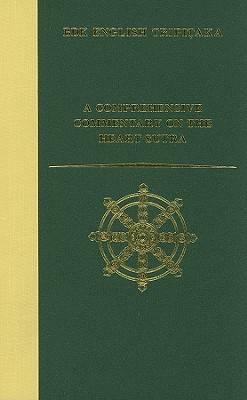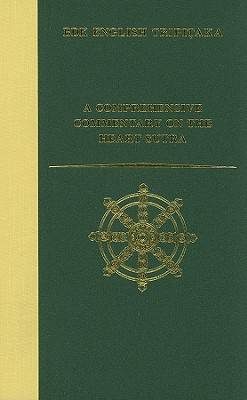
- Retrait gratuit dans votre magasin Club
- 7.000.000 titres dans notre catalogue
- Payer en toute sécurité
- Toujours un magasin près de chez vous
- Retrait gratuit dans votre magasin Club
- 7.000.000 titres dans notre catalogue
- Payer en toute sécurité
- Toujours un magasin près de chez vous
A Comprehensive Commentary on the Heart Sutra (Prajñaparamitahrdaya-Sutra)
44,95 €
+ 89 points
Description
The Hearth Sutra, a Buddhist classic and the most popular sutra in China, comprises only two hundred and sixty two words in the Chinese translation. However, it is said that the essence of the Prajnaparamita Sutra, and even the entire Mahayana teaching, is contained within it.
The Heart Sutra concisely elucidates the philosophy of sunyata (emptiness), which teaches that not only the self (atman) but also all dharmas - the elements that make up our world - are empty and ultimately nonexistant. The fact that all things in the phenomenal world are constantly changing indicates that they are devoid of inherent self-nature (svabhava). The reason that they are without selfhood is because they arise in dependence on causes and conditions (pratityasamutpada). Insight into the empty nature of everything leads to the perfection of wisdom (prajnaparamita). This is the message the Heart Sutra is conveying. The soteriological significance of sunyata lies in the fact that with the realization of emptiness one is able to eradicate attachments to the supposed reality of the self and dharmas. As a result, on can undertake spiritual endeavors egolessly. This commentary can roughly be divided into two main parts. The first part expounds the meaning of the title, Prajnaparamitahrdaya-sutra, and goes on to describe the teachings and practice of the six perfections (paramitas of the bodhisattva. The second part begins with an explanation of the bodhisattva stages (Bhumis) and then gives a detailed elucidation of the text of the Heart Sutra, sentence by sentence. It first explains the meaning of practice by citing the five stages of practice as taught by the Yogacara school, the ten perfections (paramitas), the thirteen abodes, etc. It goes on to explain the meaning and negate the reality of the characteristics of dharmas (dharma-laksanas), such as the five skandhas, the twelve sense fields, the eighteen realms, and the Four Noble Truths. Finally, it expounds the religious significance of the perfection of wisdom.Spécifications
Parties prenantes
- Editeur:
Contenu
- Nombre de pages :
- 180
- Langue:
- Anglais
- Collection :
- Tome:
- n° 66
Caractéristiques
- EAN:
- 9781886439115
- Date de parution :
- 01-05-06
- Format:
- Livre relié
- Format numérique:
- Genaaid
- Dimensions :
- 155 mm x 236 mm
- Poids :
- 453 g






